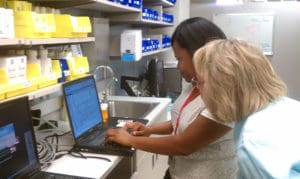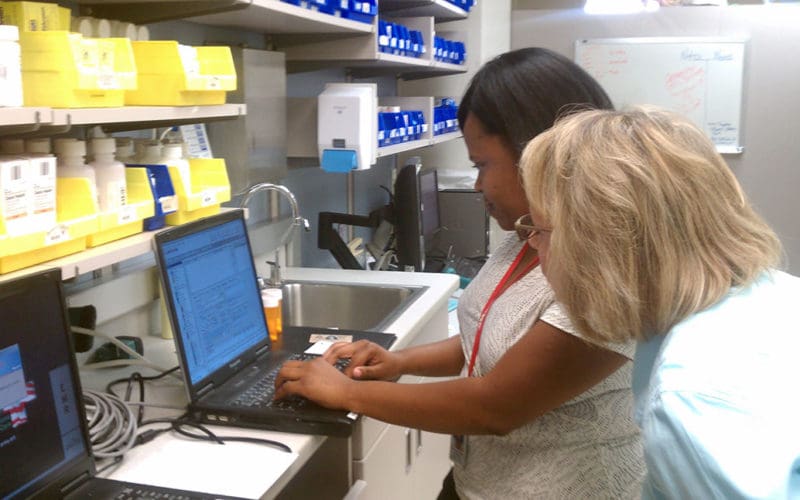
Methods for talking to a doctor from a remote location
For offshore sailors far from home, trusted medical advice is hard to come by. The benefits of telehealth, where minor medical conditions are resolved over email or video chat, are clear: It’s the surest way to access the advice of licensed doctors in the US from anywhere in the world. The practice has improved through the pandemic years, and looks likely to grow long after patients return to the waiting room, which is good news for sailors, who rely on distance consultations when abroad.
“People are more accepting of the idea that good medicine can be practiced from afar,” said Alexa Carlin, vice president of business development and human capital at World Clinic, a concierge healthcare telemedicine company popular with international travelers.
The basic format of most telehealth appointments is the same. A patient abroad contacts their telehealth provider (companies like World Clinic or Global Rescue) by whatever means they have at their disposal (including email, text, satellite phone, and video calls); licensed doctors consult with the patient; and the appropriate action is taken.
For customers of World Clinic, the appropriate action nine times out of 10 involves fishing a bottle out of the lunchbox-sized medical kit provided by the firm, and following the doctor’s directions on how to self-treat their ailment from the customized collection of pharmaceuticals and first aid gear inside.
“Every membership comes with a personal prescription medical kit,” Carlin said, “that pretty much treats about 90 percent of cases…so you won’t have to leave your boat or leave your hotel room to find a pharmacy, the physicians are on the phone with you, and you’re treated right out of your personal kit.”
For voyagers who don’t want to make unscheduled landfall, not to mention the uncertainty of dealing with local pharmacies or hospitals, the personal kit is a popular solution.
The personal medical kit does sound the same as a standard first aid kit, but the major difference is in the variety of medications included, and the presence of a doctor who knows what pharmaceuticals you have on hand (the personal kit is organized by a number system to calibrate the patient – doctor discussions).
“[The personal kit] has cardiac protective medicine in it,” Carlin said, “so if you think you’re having a heart attack and you call our physicians, they go through a whole triage process with you and they determine that you may be having a heart attack, then there’s medication in that kit that can start slowing down the heart attack to then get you to a higher level of care at a nearby facility.”
Often, “a higher level of care” means the local hospital. This presents its own difficulties for global travelers, who might struggle to trust medical systems they’ve never encountered before and highlights a major benefit of using telehealth companies: companies like World Clinic and Global Rescue research what facilities will be available at each port of call throughout your trip.
“We can tell you what the better hospital to go to is…the one where you’re not going to get more sick from going to,” said Harding Bush, manager of operations at Global Rescue, and a former Navy SEAL, “from an overseas aspect, that’s definitely one of the advantages of telehealth.”
World Clinic’s research is similar: “We do destination medical intelligence reports on people’s destinations,” Carlin said. “In all their port of calls we’ll prepare a brief on what’s available in that local area, whether it’s the local clinics, pharmacies, hospitals, the current COVID protocols….when our people get to their port of call they already know what’s available to them right off the bat; they don’t have to do any research themselves. We have a team that does that as their main focus.”
The technology behind telehealth continues to improve, but the means for good care is already in place. “What we found over the past 25 years is that simple and familiar technologies work best,” Carlin said. “The iPhone is 100% the absolute best technology we have in communicating and working with patients… you get people to adhere to what they need when they have a familiar technology in hand… there are many advancements in connected health technology but if people don’t want to adopt it, it’s completely useless.”
There is no replacement for in-person care for serious injuries, but for voyagers on an adventure it’s a plus to have options for the minor stuff, and guidance when you need it for the major stuff.
“Telehealth in general is just very convenient for somebody that’s busy, either travelling or not,” Bush said. “When you’re traveling you get on the phone, get on the computer and have an immediate consultation that day from a certified doctor.” ν
Ben Heselton-Clements is a freelance maritime journalist in Portland, Maine. His work has appeared in Professional Mariner, Pacific Maritime, and Fishermen’s News.

